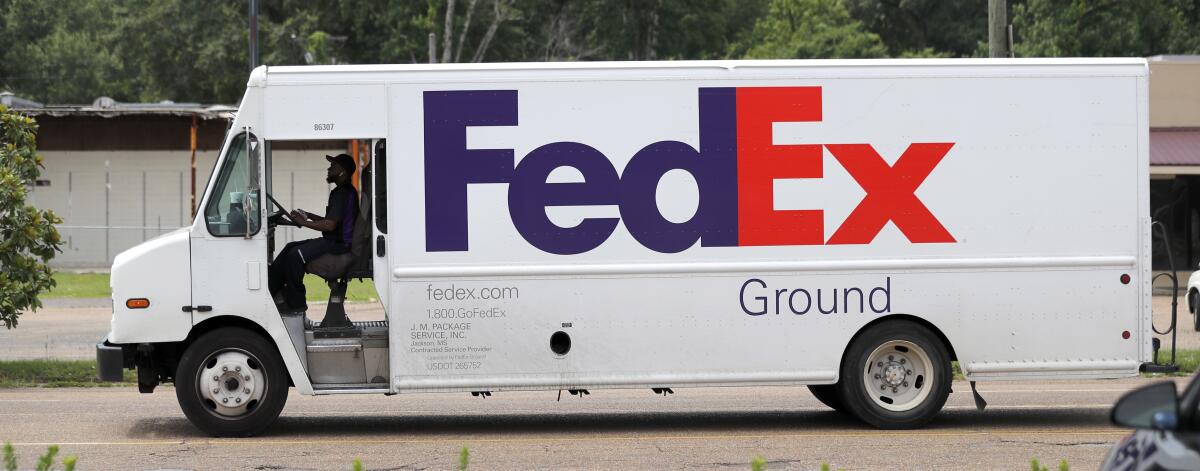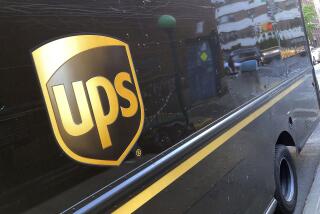FedEx plans 70,000-job hiring spree for record holiday surge

- Share via
FedEx Corp. plans to hire about 70,000 seasonal workers to handle the holiday surge of packages, up 27% from last year’s peak, in what is expected to be an unprecedented level of delivery demand.
The courier has already added thousands of workers to keep up with a jump in deliveries as consumers order more online because of coronavirus concerns. FedEx’s U.S. ground deliveries rose 20% in the quarter through May from a year earlier. The company will probably match or exceed that for its fiscal first quarter, which ended in August.
To keep up with demand, FedEx also will expand the availability of Sunday delivery service to 95% of the U.S. population by mid-September. It has also built more automated sorting centers and added capacity to handle oversize packages.
“These strategic investments will help better support what is expected to be an unprecedented holiday shipping season,” Chief Operating Officer Raj Subramaniam said in a statement Thursday.
FedEx and United Parcel Service Inc. have benefited from consumers ordering more online. That’s helped propel FedEx’s shares to surge 51% this year through Wednesday and UPS to jump 42%, compared with an 11% rise in the S&P 500. If the gains hold, they would be the biggest annual stock increases for both companies since 2013.
FedEx shares traded down 2.8% to $220.97 Thursday as the broader market tumbled.
The surge of online shopping will stick even after there’s a vaccine for the coronavirus, said Brie Carere, FedEx’s chief marketing officer. The company accelerated its estimate for when the U.S. market will reach 100 million packages a day to 2023, three years earlier than previously expected, she said. Almost 96% of that growth will come from e-commerce, and that volume should give FedEx more leverage to raise prices.
“With the growth of e-commerce and the increased need for our industry, and FedEx services in particular, we see increased revenue quality,” Carere said in an interview. “I absolutely think that fundamentally, that yield per shipment will continue to increase and accelerate.”
FedEx also is attempting to lower the cost of e-commerce deliveries by, for example, taking on packages it used to hand off to the U.S. Postal Service and moving to seven-day operations. Residential shipments are less profitable than business deliveries because fewer packages are left at each home and more driving between stops is required.
More than 60% of former SmartPost packages, lower-priced items that had been transferred to the post office for final delivery, are now handled in-house, Carere said. By the end of November it will be the “vast majority.” The move helps increase the number of packages per stop, or density.
“We are seeing significant improvement in route density as well as neighborhood density. We’re reducing miles per stop,” Carere said. “That strategy has definitely been a winner for us.”
FedEx in June announced peak-season surcharges on its largest customers for the first time in a couple of years, helping to boost revenue and ease pressure on its network.
That will become “a new norm,” Carere said. The company also is working with large shippers to presort packages before turning them over to FedEx and to increase volume on Sundays when the network has more capacity.
More to Read
Inside the business of entertainment
The Wide Shot brings you news, analysis and insights on everything from streaming wars to production — and what it all means for the future.
You may occasionally receive promotional content from the Los Angeles Times.










